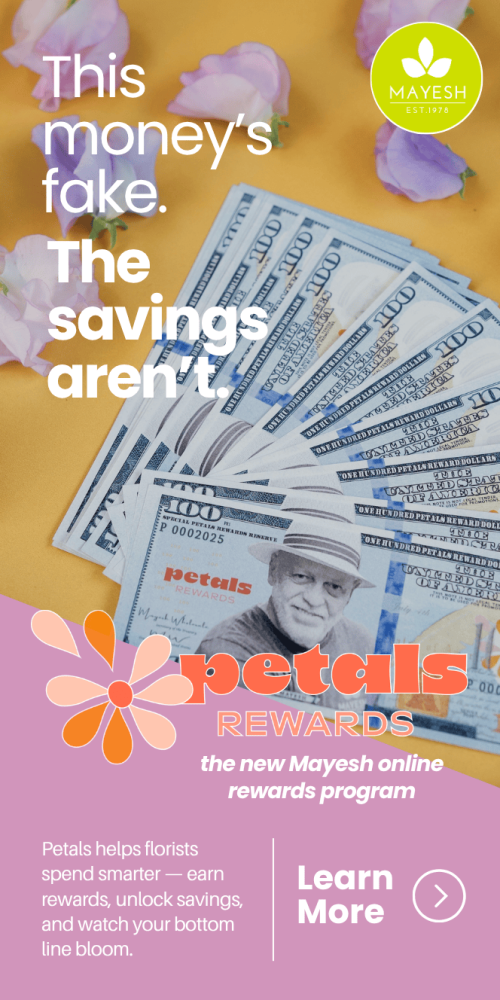Flowers and plants are more than luxuries and indulgences: They heal, unite and help people celebrate life’s events, both large and small. Take a moment to reflect on the value of what you do and how your products positively affect – and even change – people’s lives.
“My customers call me when they are about to propose, celebrate an anniversary or say goodbye to a family member. We are all connected, and flowers are the connection. People need flowers.”
Shelly Huynh Lewis, AIFD
Orchid Dynasty; Salt Lake City, Utah
As florists, we all know the incredible power of flowers, but in the hustle and bustle of running our businesses, we sometimes forget the magic and enchantment that flowers bring to those who are not around them every day. In the most important moments of people’s lives, flowers enable humans to express their emotions and sentiments, speaking for them when they can’t find the right words and in ways that words fall short of conveying.
Flowers help us to help others offer expressions of love, sympathy, congratulations and happiness. The gifts of nature we provide have the power to touch people’s hearts in unique and deep ways, and that’s why what we do is so important. We – and the products we lovingly craft – make a difference in people’s lives and, at the extreme, can even change people’s lives. It’s true, and we must never lose sight of that. We must always take time to remember how important every flower we sell and every order we fill is to the person who purchases it and the person who receives it.
Lea Romanowski, AIFD, CAFA, CAFD, of Designing on the Edge in Calgary, Ont., Canada, says that flowers are so special because they represent “a temporary moment in time” and they remind all of us that each and every minute is precious. “We, as florists, provide flowers to speak for those who can’t. People trust us with their most treasured moments,” she says.
For those who rely on the backing of science, rest assured that research consistently links flowers with well-being. According to a 10-month behavioral research study conducted at Rutgers, The State University of New Jersey, there is a really simple way to improve emotional health – by having flowers around us. The presence of flowers triggers happy emotions, heightens feelings of life satisfaction and affects social behavior in a positive manner far beyond what is normally believed.
Jeannette Haviland-Jones, Ph.D., professor of psychology at Rutgers and lead researcher on “The Emotional Impact of Flowers” study, comments, “Common sense tells us that flowers make us happy. Now, science shows that not only do flowers make us happier than we know but they also have strong positive effects on our emotional well-being.”
This study was funded by the Society of American Florists (SAF) Fund for Nationwide Public Relations, and SAF has financed other similar studies, on topics including flowers and stress relief and the emotional benefits of flowers and plants in the home and workplace. Visit safnow.org/health-benefits-research to learn more about all of SAF’s health benefits research.
Another study on the therapeutic effects of flowering and foliage plants in hospital rooms on patients recovering from surgery, conducted by Seong-Hyun Park, Ph.D., and Richard H. Mattson, Ph.D., of Kansas State University, found that patients in hospital rooms that are brightened with potted plants needed less postoperative pain medication, had lower blood pressure and pulse rates, were less anxious and tired, and generally were in a more positive psychological state than patients in rooms without plants.
Flowers in public spaces also have great benefits. Researchers from Wageningen University & Research in the Netherlands studied restaurant diners and found that people with fresh flowers on their tables seemed to be in better moods.
And just in case you’re still not convinced, Japanese researchers Seiji Shibata and Naoto Suzuki studied the effects of indoor plants on creative tasks, performance and mood, and they found evidence that links seeing green leafy plants with being more creative. Share this with your customers, telling them that a Ficus may help them focus. In addition, plants help purify the air we all breathe while they’re revving up our brains.
“Flowers teach me to breath deeply be present in the movement Honor the cycles, Burst in beauty, Express gratitude, Celebrate life, Weep in joy.”
Amy Sziber; Salt Lake City, Utah
Coming Together To Heal With Flowers
When countries around the world experience a loss and thousands are affected, it’s difficult to know what to do, and many people are left feeling helpless. Often, spontaneous memorials spring up immediately, and these shrines of beautiful bouquets and single flowers help us to feel united.
In March of this year, immediately after the tragedy of mass shootings at a mosque in Christchurch, New Zealand, literal mountains of flowers appeared around the small coastal town, further connecting the small tight-knit country. Among the flowers, there were candles, banners and messages of love and support (photo top right).
In 1997, following the death of Diana, Princess of Wales, 15 tons of bouquets and more than 60 million flowers were left by mourners in honor of Diana, at Kensington Palace in London.
Flowers are the great connector, and they can express the most powerful sentiments. These spontaneous and organic memorials are a reminder and testament that flowers help people express their emotions in ways that nothing else can.
Flowers As Feel-good Medicine
If you still have doubts about the power of flowers and the importance of what we, as florists, do on a daily basis, stop your delivery van on a random corner, and give an arrangement or bouquet to an arbitrary person, and see what happens. There’s something magical about handing a flower to a stranger and the immediate joy that follows.
In this issue’s “Question of the Month,” Remy Brault, owner of Labellum in Bozeman, Mont., shares an experience in which she did just that. One Valentine’s Day, Brault was finishing deliveries and had an extra arrangement in her van. She stopped and gave the arrangement to an older woman standing on the street, saying “Happy Valentine’s Day from me to you.” The woman’s tearful reaction made Brault re-realize that a gift of flowers means so much to so many people.
“Flowers and plants are love givers. When we show plants our appreciation and gratitude, they have the power to bring light, health and happiness to our lives.”
Rosa Solis, Rosemary Plant Care Provo, Utah
After a huge wedding or event, what happens to all the gorgeous flowers? Often times, many of them end up in the trash (or, better yet, a compost pile), but there are several organizations around the country that will recycle arrangements after events and deliver them to people in need.
Random Acts of Flowers (RAF), headquartered in Knoxville, Tenn. (randomactsofflowers.org), fosters a culture of compassion by re-cycling flowers into beautiful bouquets and then delivering them to health-care facilities across the country.
Founder and CEO Larsen Jay started RAF after a near fatal accident in 2007. He says that the many visitors and dozens of beautiful floral arrangements delivered to him helped tremendously in his recovery. He noticed that many others in the hospital didn’t have flowers, so he loaded his wheelchair and made deliveries to those people. And it made a huge impact.
One year later, Jay started Random Acts of Flowers, which receives donations from retail and wholesale florists, wedding venues, funeral homes and more. RAF serves more than 150 health care facilities including hospitals, elder-care facilities and assisted-living facilities and, to date, has made nearly 500,000 deliveries.
In Boston, Mass., Reflower Project (reflowerproject.org) is a nonprofit organization dedicated to repurposing event flowers to bring joy and happiness to others in the community. They take care of properly removing, repurposing and delivering flowers to nursing homes, elder communities, nonprofit shelters and more. They also receive donations from local flower retailers and wholesalers.
There are many other similar organizations, among them The Bloom Project (thebloomproject.org) and Repeat Roses (repeatroses.com). Take a moment now and check out these organizations, and see if any of them have affiliates or offer services in your area. That way, your flowers can touch and brighten the lives of countless more people.
Similarly, Bloomerent (bloomerent.com/) is an organization that matches customers with florists and then matches additional customers who can use the same gently used florals at a second event. When using a Bloomerent florist and flowers are being repurposed, the florist is responsible for renewing centerpieces between one event to the next, so customers never have to worry about receiving less-than-perfect flowers. Both events save money, and the florist’s hard work and talent lives to see another day by being resold.
Fresh from the Pacific Northwest
Paying It Forward With Flowers
Today, many organizations and individual businesses are participating in events such as SAF’s “Petal It Forward” campaigns. One day a year, SAF members participate in this nationwide campaign to give away flowers to promote their businesses and make people smile. Since its beginning in 2016, thousands of people throughout the United States, Canada and Colombia have experienced the joy of giving and receiving flowers.
Last year, on Oct. 24, 2018, florists nationwide randomly surprised people on the streets with flowers in 410 cities in all 50 states. Lucky recipients received two bouquets – one to keep and one to share with a friend, family member, co-worker or even a complete stranger. This year, “Petal It Forward” will happen on Oct. 23, 2019. Visit safnow.org/petal itforward for more details.
In San Francisco, Calif., “American Tulip Day” (americantulipday.com) is celebrated in a big way. On March 2 this year, more than 100,000 tulips covered Union Square, and the public was invited to visit the 2.6-acre plaza and to pick bunches of beautiful tulips free of charge. In just three and a half hours, all 100,000 blooms had been taken, giving many San Francisco households a feeling of early spring. It was all made possible by Dutch flower bulb promoters Royal Anthos and iBulb.org.























